The Governance of Nigeria’s Social Protection: The Burdens of Developmental Welfarism?
Abstract
1. Introduction
2. Social Protection as a compelling Social Policy tool
3. Conceptualising Social Protection
4. Defining Developmental Welfarism and Developmental State
5. Contesting Developmental Welfarism and Reimagining Its Logic
6. Nigeria: A Muddled Site of Social Policy Failures or an Experiment in Burdened DSW?
7. Interrogating the Governance of Nigerian Social Protection (2016 to date)
8. Addressing Governance Challenges and Reconfiguring Nigerian Social Protection
9. Conclusions
Funding
Institutional Review Board Statement
Informed Consent Statement
Data Availability Statement
Conflicts of Interest
References
- Grindle, M.S. Politics and Policy Implementation in the Third World; Princeton University Press: Princeton, NJ, USA, 1980. [Google Scholar]
- Akinleye, O.; Akinola, O.; Akinrimisi, A.; Shadare, O.A.; Shadare, G.A. What have we learnt from ten years of conditional cash transfers (CCT) programmes in Nigeria? Evidence and lessons from two independent studies. CROP Poverty Brief. No. 52. October 2019. Available online: https://www.crop.org/viewfile.aspx?id=1613 (accessed on 10 October 2020).
- Shadare, G.A. Conditional Cash Transfers in Nigeria—An Exploratory Study. Ph.D. Thesis, University of Sheffield, Sheffield, UK, 2020. [Google Scholar]
- Shadare, G.A. Transformation of Social Transfer Programmes in Nigeria—A Political Settlement Explanation. Working Paper Published by IPC-IG/Socialprotection.org. 2019. Available online: https://www.socialprotection.org/discover/publications/nigerias-social-protection-cusp-transformation (accessed on 14 May 2021).
- International Labour Organisation. World Social Protection Report 2020–2022: Social Protection at the Crossroads—In Pursuit of a Better Future; ILO: International Labour Office: Geneva, Switzerland, 2021. [Google Scholar]
- Gentilini, U.; Almenfi, M.; Orton, I.; Dale, P. Social Protection and Jobs Responses to COVID-19. 2020. Available online: http://documents.worldbank.org/curated/en/383541588017733025/pdf/Social-Protection-and-Jobs-Responses-to-COVID-19-A-Real-Time-Review-of-Country-Measures-October-24-2020.pdf (accessed on 14 May 2021).
- UNDP. The State of Social Assistance in Africa; United Nations Development Programme: New York, NY, USA, 2019. [Google Scholar]
- Samson, M.; Taylor, N. Supporting Social Protection Systems; EC Tools and Methods Series Concept Paper 4; EU Publications Office: Luxembourg, 2015. [Google Scholar]
- FAO. Resilience Analysis in Borno State, Nigeria; FAO: Rome, Italy, 2019. [Google Scholar]
- UNRISD. Combating Poverty and Inequality: Structural Change, Social Policy and Politics; UNRISD: Geneva, Switzerland, 2010. [Google Scholar]
- Devereux, S.; Sabates-Wheeler, R. Transformative Social Protection; IDS Working Paper 232; Institute of Development Studies: Brighton, UK, 2004. [Google Scholar]
- Johnson, C. MITI and the Japanese Miracle: The Growth of Industrial Policy 1925–1975; Stanford University Press: Stanford, CA, USA, 1982. [Google Scholar]
- Johnson, C. The developmental state: Odyssey of a concept. In The Developmental State; Woo-Cumings, M., Ed.; Cornell University Press: Ithaca, NY, USA, 1999; pp. 32–60. [Google Scholar]
- Evans, P. The state as problem and solution: Predation, embedded autonomy, and structural change. In The Politics of Economic Adjustment; Haggard, S., Kaufman, R.R., Eds.; Princeton University Press: Princeton, NJ, USA, 1992; pp. 139–181. [Google Scholar]
- Bolesta, A. China as a developmental state. Montenegrin J. Econ. 2007, 3, 105–111. [Google Scholar]
- Adesina, J.O. Rethinking the Social Protection Paradigm: Social Policy in Africa’s Development. In Proceedings of the Promoting Resilience through Social Protection in Sub-Saharan Africa, Dakar, Senegal, 28–30 June 2010. [Google Scholar]
- Adesina, O.J. Accounting for Social Policy: Reflections on recent developments in sub-Saharan Africa, Paper presented at the UNRISD Conference. In Proceedings of the New Directions in Social Policy: Alternatives from and for the Global South, Geneva, Switzerland, 7–8 April 2014. [Google Scholar]
- Midgley, J. Social Development: The Developmental Perspective in Social Welfare; Sage: London, UK, 1995. [Google Scholar]
- Patel, L. Social Welfare and Development in South Africa; Oxford University Press Southern Africa: Cape Town, South Africa, 2005. [Google Scholar]
- Midgley, J.; Tang, K.L. Introduction: Social policy, economic growth and developmental welfare. Int. J. Soc. Welf. 2001, 10, 244–252. [Google Scholar] [CrossRef]
- Mkandawire, T. How the New Poverty Agenda Neglected Social and Employment Policies in Africa. J. Hum. Dev. Capab. 2010, 11, 37–56. [Google Scholar] [CrossRef]
- Venieris, D. Social Policy in Dribs and Drabs for the Greek Crisis. In Modeling Economic Growth in Contemporary Greece; Emerald Publishing Limited: London, UK, 2021. [Google Scholar]
- Adewale, A.R. The Political, Economic and Social Dynamics of Nigeria: A Synopsis, Africa Institute of South Africa. In AISA Policy Briefing; No. 39; African Institute of South Africa: Johannesburg, South Africa, 2011. [Google Scholar]
- Achebe, C. The Trouble with Nigeria; Heinemann Publishers Ltd.: London, UK, 1984. [Google Scholar]
- Paden, J.N. Faith and Politics in Nigeria: Nigeria a Pivotal State in the Muslim World; United States Institute of Peace Press: Washington, DC, USA, 2008. [Google Scholar]
- World Bank. The State of Social Safety Nets 2018; World Bank: Washington, DC, USA, 2018. [Google Scholar]
- World Bank. Investing in Human Capital for Nigeria’s Future; Nigeria Biannual Economic, Update; World Bank Group: Washington, DC, USA; World Bank: Washington, DC, USA, 2018. [Google Scholar]
- World Bank. World Development Report 2019. The Changing Nature of Work; World Bank: Washington, DC, USA, 2019. [Google Scholar]
- World Bank. Advancing Social Protection in a Dynamic Nigeria; World Bank Group: Washington, DC, USA, 2020; Available online: http://documents.worldbank.org/curated/en/612461580272758131/Advancing-Social-Protection-in-a-Dynamic-Nigeria (accessed on 15 May 2021).
- National Bureau of Statistics [NBS]. Consumption Expenditure Pattern in Nigeria 2019; National Bureau of Statistics, FCT: Abuja, Nigeria, 2019. Available online: https://www.nigerianstat.gov.ng/pdfuploads/Consumption%20Expenditure%20Pattern%20in%20Nigeria%202019.pdf (accessed on 14 May 2021).
- National Bureau of Statistics [NBS]. COVID-19 Impact Monitoring, Nigeria, Round 3, July 2020; National Bureau of Statistics, Nigeria & LSMS, The World Bank; 2020. Available online: https://www.nigerianstat.gov.ng/ (accessed on 14 May 2021).
- National Bureau of Statistics [NBS]. Selected Food Prices Watch; National Bureau of Statistics; 2020. Available online: https://www.nigerianstat.gov.ng/ (accessed on 10 October 2021)National Bureau of Statistics.
- United Nations Population Fund (UNFPA). The State of the World Population 2014: The Power of 18 Billion Adolescents Youth and the Transformation of the Future; UNFPA: New York, NY, USA, 2014. [Google Scholar]
- UNFPA Nigeria. Data Overview and Key Results of Nigeria in 2018; UNFPA Nigeria: Abuja, Nigeria, 2019. [Google Scholar]
- National Bureau of Statistic [NBS]. Economic Outlook for the Nigerian Economy: 2013–2016; NBS: Abuja, Nigeria, 2014. [Google Scholar]
- National Bureau of Statistics [NBS]. Nigeria Poverty Profile 2010; NBS: Abuja, Nigeria, 2014. [Google Scholar]
- Olomola, A.S.; Mogues, T.; Olofinbiyi, T.; Nwoko, C.; Udoh, E.; Alabi, R.A.; Woldeyohannes, S. Analysis of Agricultural Public Expenditures in Nigeria: Examination at the Federal, State, and Local Government Levels; IFPRI Discussion Paper 01395; IFPRI: Washington, DC, USA, 2014. [Google Scholar]
- Awoyemi, O. Igboro ti Daru: Governance, Leadership, Ethics—How to Build A Thriving Nigerian Economy. Present at the Convention on Business Integrity, Lekki Lagos, Nigeria, 28 June 2019. [Google Scholar]
- Gboyega, A.; Søreide, T.; Mihn-Le, T.; Shukla, G.P. Political Economy of the Petroleum Sector in Nigeria; Policy Research Working Paper 5779. Africa Region; The World Bank: Washington, DC, USA, 2011. [Google Scholar]
- Holmes, R.; Akinrimisi, A.; Morgan, J.; Buck, R. Social Protection in Nigeria: Mapping Programmes and Their Effectiveness; ODI: London, UK, 2012. [Google Scholar]
- Central Bank of Nigeria (CBN). National Financial Inclusion Strategy (Revised); CBN: Abuja, Nigeria, 2018; Available online: https://www.cbn.gov.ng/Out/2019/CCD/NATIONAL%20FINANCIAL%20INCLUSION%20STRATEGY.pdf (accessed on 12 October 2020).
- Devereux, S. Trajectories of Social Protection in Africa. Dev. South. Afr. 2013, 30, 13–23. [Google Scholar] [CrossRef]
- Patel, L. The Child Support Grant in South Africa: Gender, care, and social investment. In Social Investment and Social Welfare: International and Critical Perspectives; Midgley, J., Dahl, E., Wright, A., Eds.; Edward Elgar: Cheltenham, UK, 2017. [Google Scholar]
- Roy, R.; Week, J. Making Fiscal Policy Work for the Poor; UNDP: New York, NY, USA, 2004. [Google Scholar]
- Roberts, J. Poverty Reduction Outcomes in Education and Health Public Expenditure and Aid; Overseas Development Institute: London, UK, 2003. [Google Scholar]
- Simson, R. Following the Money: Examining the Evidence on Pro-Poor Budgeting; Overseas Development Institute (ODI): London, UK, 2012. [Google Scholar]
- Amakom, U. Public expenditure on education and healthcare in Nigeria: Who benefits and why? Int. J. Bus. Manag. 2012, 7, 48–59. [Google Scholar] [CrossRef][Green Version]
- Amakom, U.; Ogujiuba, K. Distributional Impact of Public Expenditure on Education and Healthcare in Nigeria: A Gender Based Welfare Dominance Analysis. Int. J. Bus. Manag. 2010, 5, 116. [Google Scholar] [CrossRef][Green Version]
- UNESCO. 2020 Global Education Monitoring Report: Inclusion and Education: All Means All; UNESCO: Paris, France, 2020. [Google Scholar]
- Eneji, M.A.; Dickson, J.V.; Bisong, J.O. Health care expenditure, health status and national productivity in Nigeria (1999–2012). J. Econ. Int. Financ. 2013, 5, 258–272. [Google Scholar] [CrossRef]
- Olateju, O.I.; Adeyemi, O.T.; Okunnu, M.A. Measuring the Distributional Impact of Public Health Spending on Poverty in Nigeria; Mimeo: Bucharest, Romania, 2009; Unpublished. [Google Scholar]
- Rasul, I.; Rogger, D. The impact of ethnic diversity in bureaucracies: Evidence from the Nigerian civil service. Am. Econ. Rev. 2015, 105, 457–461. [Google Scholar] [CrossRef]
- Joseph, R.A. Democracy and Prebendal Politics in Nigeria: The Rise and Fall of the Second Republic; Cambridge University Press: Cambridge, UK, 1987. [Google Scholar]
- Joseph, R.A. Nigeria: Inside the Dismal Tunnel. Curr. Hist. 1996, 95, 193–200. [Google Scholar]
- Kaplan, S. Identifying the Truly Fragile States. Wash. Q. 2014, 37, 49–67. [Google Scholar] [CrossRef]
- Federal Republic of Nigeria. Constitution of the Federal Republic of Nigeria 1999 (With Alterations); National Assembly Printing Press: Abuja, Nigeria, 1999. [Google Scholar]
- Swamy, M.K. Financial management analysis of western world misleading-cum-wrong assessment of Nigeria as a percentage of a rich country in the midst of widening poverty gap: Proposal for negative income tax policy. J. Financ. Manag. Anal. 2012, 25, 85–90. [Google Scholar]
- Tang, K.L. The determinants of social security in developing countries: A comparative analysis. International Social Work 1996, 39(4), 377–393. [Google Scholar] [CrossRef]
- Adesina, O.J. (Ed.) Social Policy in Sub-Saharan African Context: In Search of Inclusive Development; Palgrave: Basingstoke, UK, 2007. [Google Scholar]
- Garba, A.G. Ruling ideas and social development in Sub-Saharan Africa: An assessment of nationalist, Keynesian and Neoliberal paradigms. In Social Policy in Sub-Saharan African Context; Palgrave Macmillan: London, UK, 2007; pp. 54–86. [Google Scholar]
- Ayoade, J.A.A.; Akinsanya, A.A.; Ojo, O.J.B. (Eds.) Nigeria: Descent into Anarchy and Collapse? University Press America: New York, NY, USA, 2014. [Google Scholar]
- Ayoade, J.A.A.; Akinsanya, A.A.; Ojo, O.J.B. (Eds.) The Jonathan Presidency: The Sophoomre Year; University Press America: New York, NY, USA, 2014. [Google Scholar]
- Ayoade, J.A.A.; Akinsanya, A.A.; Ojo, O.J.B. (Eds.) The Jonathan Presidency: The First Year; University Press America: New York, NY, USA, 2013. [Google Scholar]
- Hagen-Zanker, J.; Holmes, R. Social Protection in Nigeria: Synthesis Report; Overseas Development Institute and UNICEF Nigeria: London, UK, 2012. [Google Scholar]
- Shadare, G.A. Is Nigeria on the Cusp of Social Protection Transformation? Blog post published by Development Pathways Ltd.: Orpington, UK, 2017; Available online: https://www.developmentpathways.co.uk/nigerias-socialprotection-cusp-transformation (accessed on 18 October 2020).
- Ulriksen, M.S. Questioning the pro-poor agenda: Examining the links between social protection and poverty. Dev. Policy Rev. 2012, 30, 261–281. [Google Scholar] [CrossRef]
- Adesina, O.J. Beyond the Social Protection Paradigm: Social Policy in Africa’s Development. Can. J. Dev. Stud. 2011, 32, 454–470. [Google Scholar] [CrossRef]
- Cammett, M.C.; MacLean, L.M. Introduction: The political consequences of non-state social welfare in the Global South. Stud. Comp. Int. Dev. 2011, 46, 1–21. [Google Scholar] [CrossRef]
- Akanle, O. The development exceptionality of Nigeria: The context of political and social currents. Afr. Today 2014, 59, 31–48. [Google Scholar] [CrossRef]
- Iversen, T. Democracy and Capitalism. In Oxford Handbook of the Welfare State; Castles, F., Liebried, S., Lewis, J., Obinger, H., Pierson, C., Eds.; Oxford University Press: Oxford, UK, 2010; pp. 183–196. [Google Scholar]
- Wood, G. Situating informal welfare within imperfect well-being regimes. J. Int. Comp. Soc. Policy 2015, 31, 132–150. [Google Scholar] [CrossRef]
- Gough, I.; Wood, G.; Barrientos, A.; Bevan, P.; Davis, P.; Room, G. (Eds.) Insecurity and Welfare Regimes in Asia, Africa and Latin America: Social Policy in Development Contexts; Cambridge University Press: Cambridge, UK, 2004. [Google Scholar]
- Urbina-Ferretjans, M.; Surender, R. Enhancing global cooperation in social development. In Future Directions in Social Development; Palgrave Macmillan: New York, NY, USA, 2017; pp. 227–249. [Google Scholar]
- Kwon, H.J. Beyond European welfare regimes: Comparative perspectives on East Asian welfare systems. J. Soc. Policy 1997, 26, 467–484. [Google Scholar] [CrossRef]
- Wilding, P. Is the East Asian welfare model still productive? J. Asian Public Policy 2008, 1, 18–31. [Google Scholar] [CrossRef]
- Wilding, P. Exploring the East Asian Welfare Model. Public Adm. Policy 2000, 9, 71–82. [Google Scholar]
- Holliday, I. Productivist welfare capitalism: Social policy in East Asia. Political Stud. 2000, 48, 706–723. [Google Scholar] [CrossRef]
- Akinola, O. Governing Social Protection in Developing Countries through Community-Based Targeting Mechanisms: A Case Study of Nigeria’s “In Care of the People” Conditional Cash Transfer Programme. Ph.D. Thesis, University of Guelph, Guelph, ON, Canada, 2017. [Google Scholar]
- National Cash Transfer Office [NCTO]. Federal Government Commences Programme to Support the Poor in Nasarawa. 2018. Available online: https://ncto.gov.ng/fed-government-commences-programme-to-support-the-poor-in-nasarawa/ (accessed on 14 May 2021).
- Apera, I.; Daniel, A.; Balogun, M.; Mohammed, M.; Lawal, A.; Abdullahi, K.; Nongo, S. National Social Register: An Approach to Social Protection and Poverty Reduction in Nigeria. Radic. Stat. Newsl. 2021, 129, 29–44. [Google Scholar]
- Kwon, H.K. Politics of globalisation and national economy: The German experience compared with the United States. Politics Soc. 2012, 40, 467–484. [Google Scholar] [CrossRef]
- Walker, A.; Wong, C.K. The relationship between social policy and economic policy: Constructing the public burden of welfare in China and the West. Dev. Soc. 2009, 38, 1–26. [Google Scholar]
- Walker, A.; Wong, C.K. (Eds.) East Asian Welfare Regimes in Transition: From Confucianism to Globalization; Policy Press: Bristol, UK, 2005. [Google Scholar]
- Andersson, L. Operationalising social investment: From policy dimensions to ideal-types. J. Int. Comp. Soc. Policy 2018, 34, 109–125. [Google Scholar] [CrossRef]
- Jenson, J. Redesigning citizenship regimes after neoliberalism. Moving towards social investment. In What Future for Social Investment; Morel, N., Palier, B., Palme, J., Eds.; Institute for Future Studies: Stockholm, Sweden, 2009; pp. 27–44. [Google Scholar]
- Jenson, J. Diffusing ideas for after neoliberalism: The social investment perspective in Europe and Latin America. Glob. Soc. Policy 2010, 10, 59–84. [Google Scholar] [CrossRef]
- Morel, N.; Palier, B.; Palme, J. (Eds.) Towards a Social Investment State? Ideas, Policies and Challenges; Policy Press: Bristol, UK, 2012. [Google Scholar]
- Morel, N.; Palier, B.; Palme, J. Introduction. In What Future for Social Investment? Morel, N., Palier, B., Palme, J., Eds.; Institute for Future Studies: Stockholm, Sweden, 2009; pp. 15–22. [Google Scholar]
- Bengtsson, M.; de la Porte, C.; Jacobsson, K. Labour market policy under conditions of permanent austerity: Any sign of social investment? Soc. Policy Adm. 2017, 51, 367–388. [Google Scholar] [CrossRef]
- Beland, D. Ideas and institutions in social policy research. Soc. Policy Adm. 2016, 50, 734–750. [Google Scholar] [CrossRef]
- Bastagli, F.; Hagen-Zanker, J.; Harman, L.; Barca, V.; Sturge, G.; Schmidt, T. The Impact of Cash Transfers: A Review of the Evidence from Low- and Middle-income Countries. J. Soc. Policy 2019, 48, 569–594. [Google Scholar] [CrossRef]
- Bastagli, F.; Hagen-Zanker, J.; Harman, L.; Barca, V.; Sturge, G.; Schmidt, T. Cash transfers: What does the Evidence say? A Rigorous Review of Programme Impact and of the Role of Design and Implementation Features; ODI: London, UK, 2016. [Google Scholar]
- Davis, B.; Handa, S.; Hypher, N.; Winder-Rossi, N.; Winters, P.; Yablonski, J. From Evidence to Action: The Story of Cash Transfers and Impact Evaluation in Sub-Saharan Africa, 1st ed.; FAO and UNICEF and Oxford University Press: Oxford, UK, 2016. [Google Scholar]
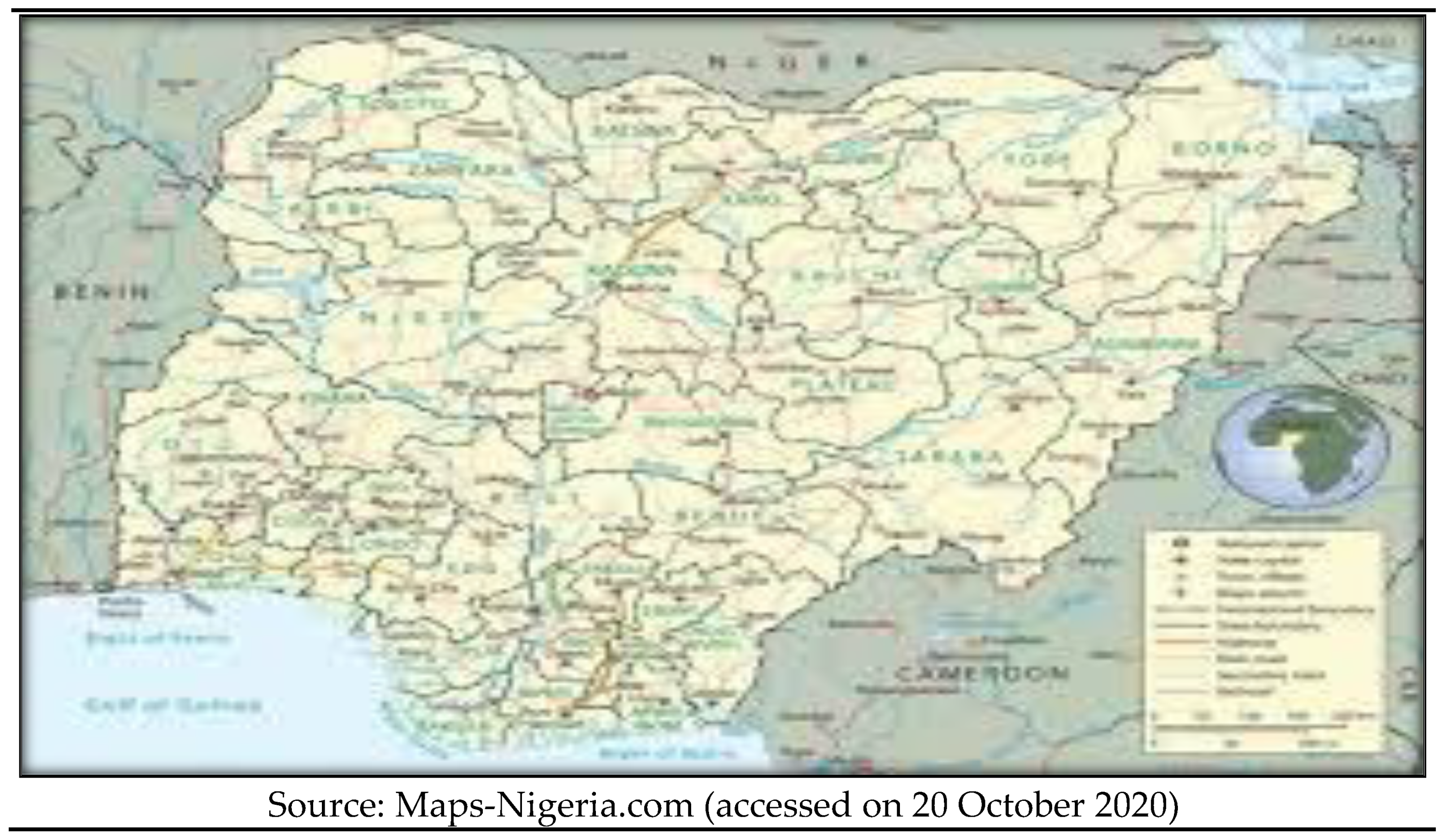
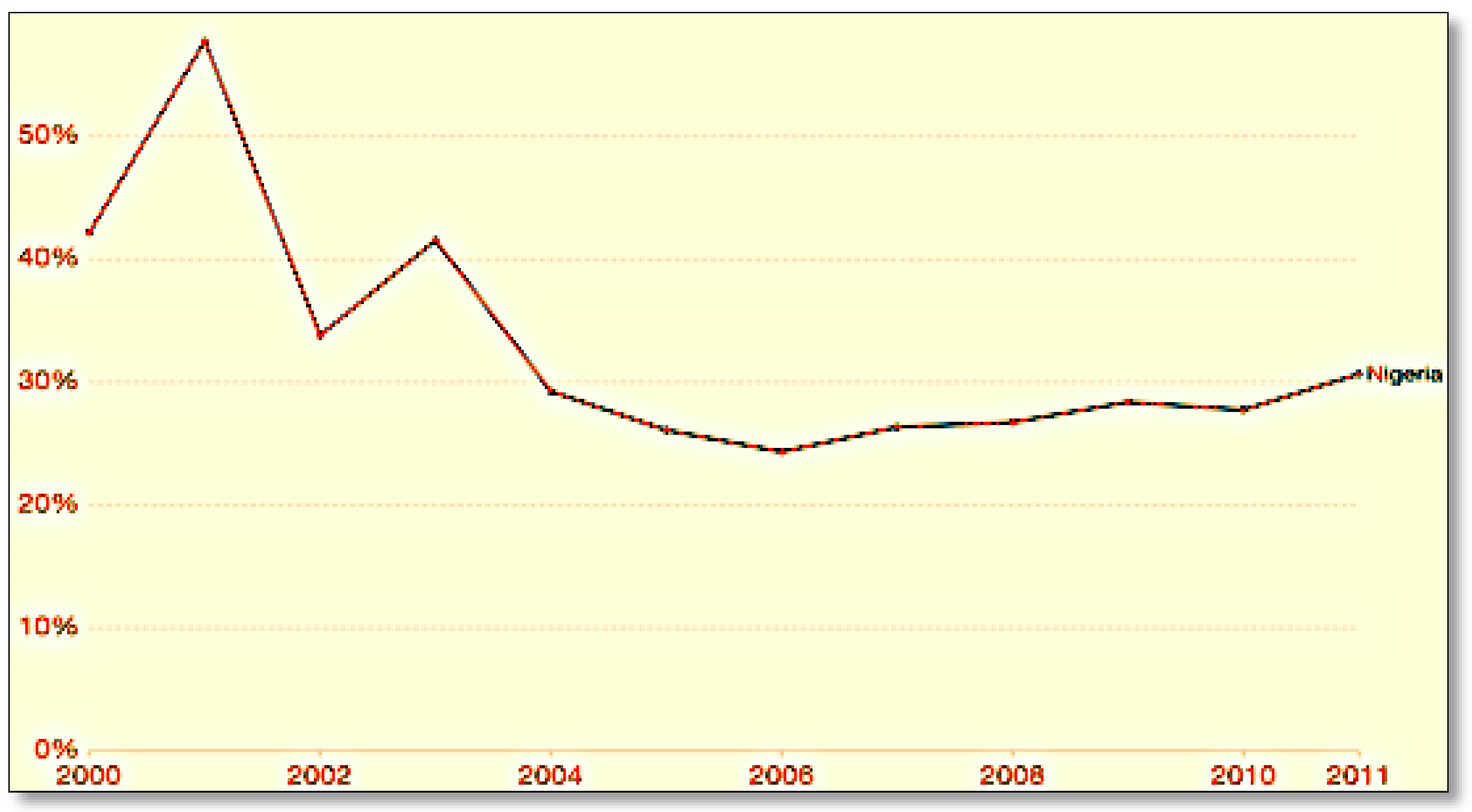
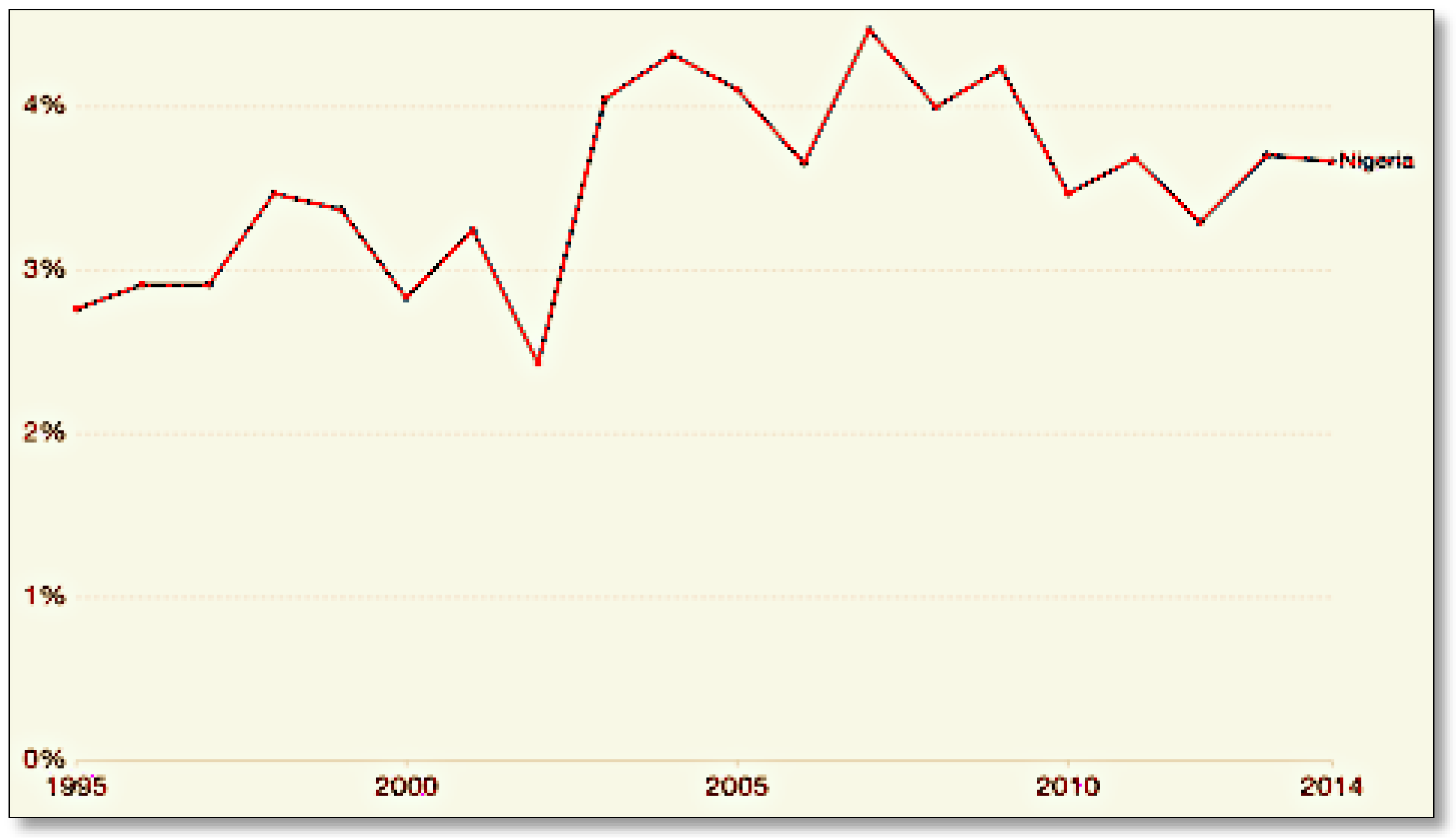
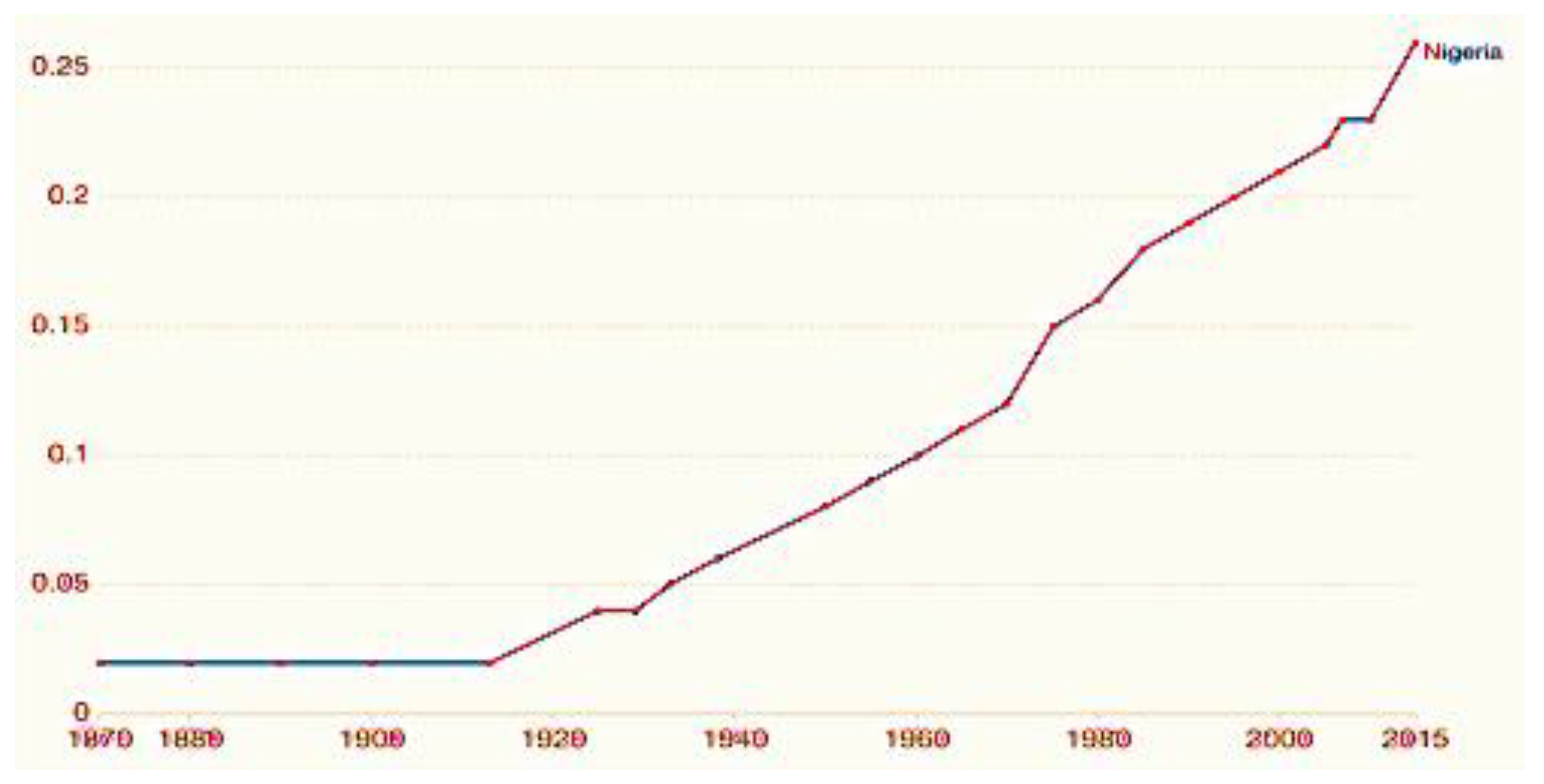
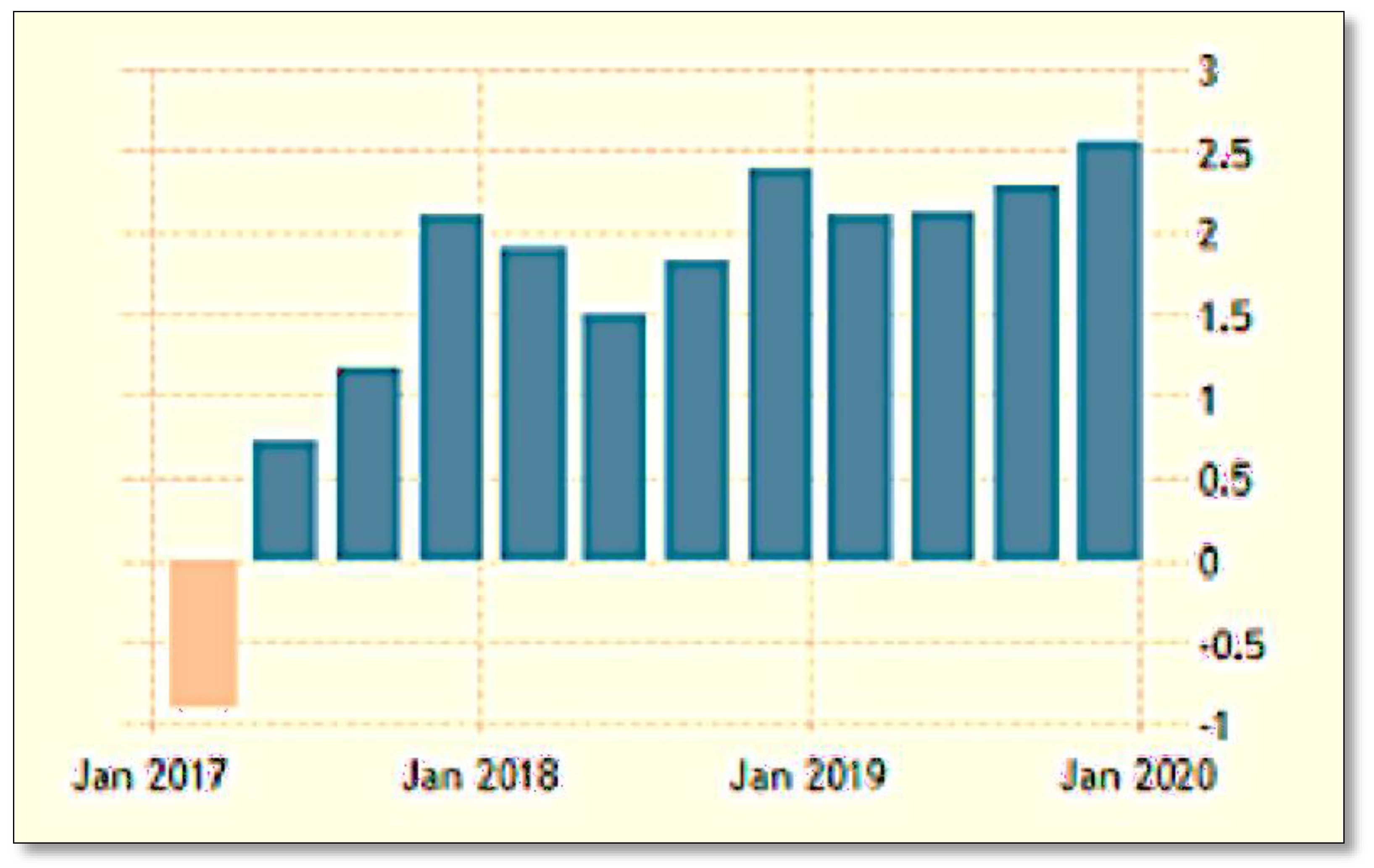

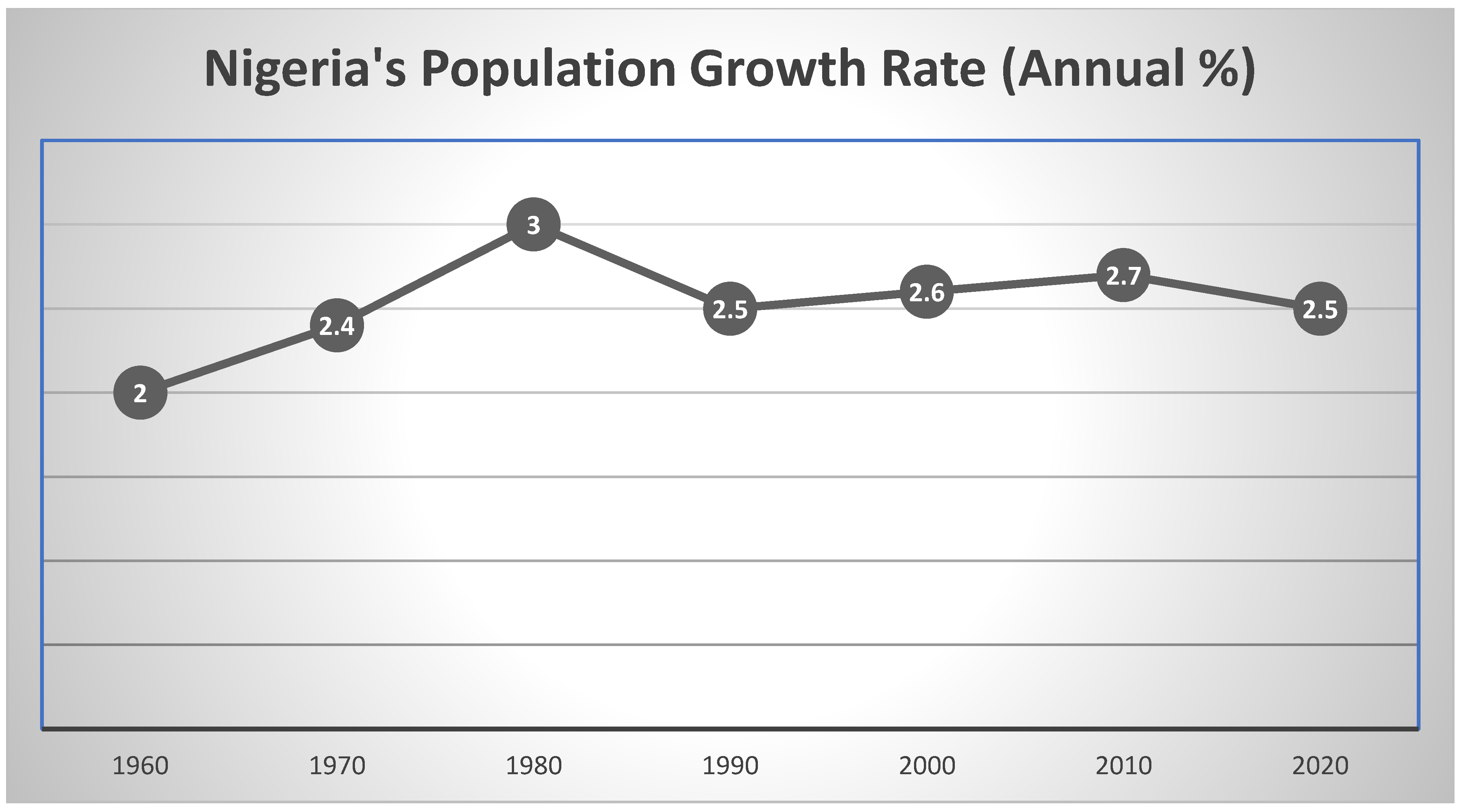

Publisher’s Note: MDPI stays neutral with regard to jurisdictional claims in published maps and institutional affiliations. |
© 2022 by the author. Licensee MDPI, Basel, Switzerland. This article is an open access article distributed under the terms and conditions of the Creative Commons Attribution (CC BY) license (https://creativecommons.org/licenses/by/4.0/).
Share and Cite
Shadare, G.A. The Governance of Nigeria’s Social Protection: The Burdens of Developmental Welfarism? Societies 2022, 12, 20. https://doi.org/10.3390/soc12010020
Shadare GA. The Governance of Nigeria’s Social Protection: The Burdens of Developmental Welfarism? Societies. 2022; 12(1):20. https://doi.org/10.3390/soc12010020
Chicago/Turabian StyleShadare, Gbenga Akinlolu. 2022. "The Governance of Nigeria’s Social Protection: The Burdens of Developmental Welfarism?" Societies 12, no. 1: 20. https://doi.org/10.3390/soc12010020
APA StyleShadare, G. A. (2022). The Governance of Nigeria’s Social Protection: The Burdens of Developmental Welfarism? Societies, 12(1), 20. https://doi.org/10.3390/soc12010020





